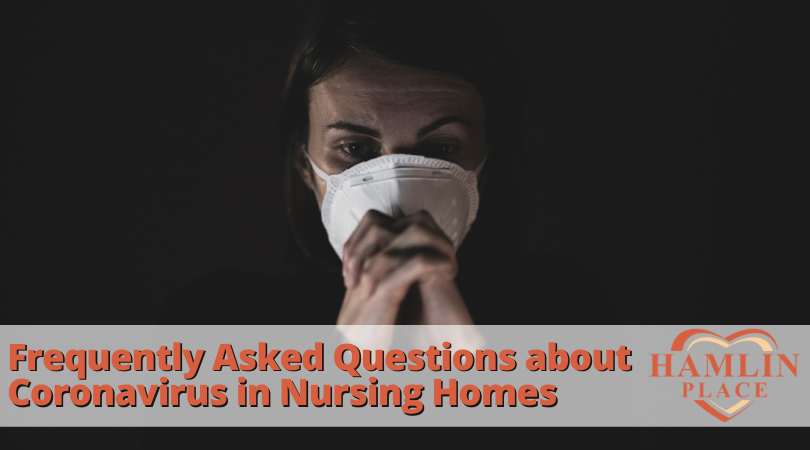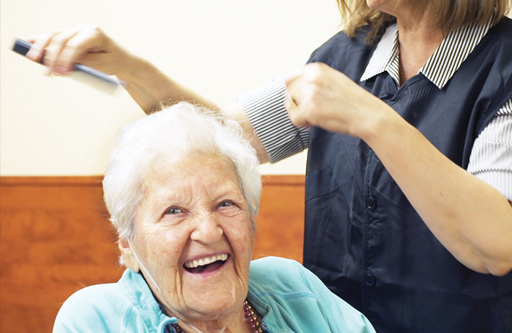
Frequently Asked Questions about Coronavirus in Nursing Homes
Americans have a lot of questions about the coronavirus COVID-19 and nursing homes. Unfortunately, a lot of available answers are complicated. Finding simple answers about coronavirus in nursing homes can seem overwhelming. News reports and government websites offer information, but it is very technical and lengthy.
Common Questions about Coronavirus
If you have general questions about the coronavirus COVID-19, you may find some helpful answers and information below.
What are the symptoms of coronavirus?
People who have the coronavirus report a variety of symptoms. Some people experience a mild illness, while others report more sudden, extreme symptoms.
According to the Centers for Disease Control and Prevention (CDC), the most common symptoms include:
- Fever
- Cough
- Chest pain
- Shortness of breath
- Chills
- Headache
- Muscle pain
These symptoms generally appear between two and 14 days after exposure to the coronavirus. Not everyone who has the coronavirus will have these symptoms. Some people have only a few, and others have no symptoms at all.

What are the emergency warning signs for someone with the coronavirus disease?
People who have the coronavirus should monitor their symptoms closely. General symptoms can worsen gradually or suddenly, and may require medical attention. The CDC urges anyone with the following symptoms to get medical attention immediately:
- Difficulty breathing
- Persistent chest pain or pressure
- Confusion
- Inability to rouse
- Blue tint to face or lips
These symptoms are serious. If you or someone in your household has these symptoms, you should call 911 or go to your nearest emergency room (ER) right away. Inform the operator or person at the ER that you believe the patient has COVID-19. If possible, wear a face covering.
How is COVID-19 treated?
There is currently no official treatment for the coronavirus COVID-19. Like other viruses, the symptoms of coronavirus will go away on their own. The duration of the illness depends on the individual and whether he or she has other medical conditions. Doctors may prescribe fever reducer or pain reliever to help manage symptoms. Most people are able to manage symptoms and heal at home. Doctors recommend getting plenty of rest and drinking lots of fluids to stay hydrated.
Researchers are working to develop a vaccine or treatment option for the coronavirus. They are working on a treatment option similar to Tamiflu, which reduces the duration of the flu. A similar treatment option for the coronavirus could help reduce the severity and duration of the illness.
Can someone who has been quarantined for COVID-19 spread the illness to others?
Being in quarantine means that you are separated from people who have been exposed to the coronavirus, but have not shown symptoms within the standard incubation period. For COVID-19, the incubation period is 14 days. According to the CDC, after 14 days, if there are no remaining symptoms, you should not be a risk for spreading the virus to others.
Questions About Coronavirus in Nursing Homes
In addition to the common questions that many American’s are asking about coronavirus, a lot of people have questions about coronavirus in nursing homes. Here are some of the questions that we are receiving at Nursing Home Abuse Center.
How does coronavirus spread in nursing homes?
Healthcare experts call nursing homes a “perfect storm,” “breeding ground” and “hotspot” for coronavirus. That is because the virus continues to spread rapidly in nursing homes causing thousands of illnesses and deaths among residents and staff members.
We know that the coronavirus spreads primarily through respiratory droplets. That is, when someone coughs or sneezes – those droplets of bodily fluid that leave the body. But the coronavirus can also spread through touching surfaces that have germs on them. The spread of coronavirus in nursing homes is thought to be rampant because of several factors, such as:
- Nursing homes house a lot of people in a relatively confined area.
- Nursing home staff and residents share many of the same spaces, including dining, public areas and activity areas.
- Many nursing home residents have underlying medical conditions that make them more vulnerable to diseases, particularly viral infections.
- Staff members are vulnerable because they work directly with residents and may be exposed to bodily fluids, including respiratory droplets.
- Staff members continue to work after contracting the illness. People who are asymptomatic can still spread the disease.
Why is coronavirus in nursing homes such a continuing problem?
Many nursing homes are not following infection control guidelines to prevent the spread of the coronavirus. Furthermore, because many people who have the virus do not have symptoms, the coronavirus may be in nursing homes without staff or resident knowledge. This contributes to outbreaks because staff do not know that infection control measures need to be initiated.
Can I request my loved one be tested for coronavirus?
CDC guidelines state that not everyone needs to be tested for coronavirus. If your loved one living in a nursing home has symptoms of coronavirus, you can talk to their primary healthcare provider about whether they need to be tested. Their healthcare provider and the facility will work together to determine if testing is needed.
Can I visit a friend or family member who lives in a nursing home?
The CDC has recommended that all non-essential visits to nursing homes be temporarily suspended. Visitors who are asymptomatic are a known cause of spread in nursing homes. The CDC recommends that no visitors be allowed in nursing homes except in very certain situations. Those situations include end-of-life care and compassionate care. Even in these situations, visitors must be screened for a fever and symptoms of coronavirus. Visitors who have a fever or symptoms should not be allowed to enter the nursing home.
What are some alternatives to visitation that I can use?
Not being able to visit your loved ones is definitely challenging. Fortunately, technology allows us some alternatives to physical visits. Many nursing homes are providing residents with access to tablets or iPads in order to interact with loved ones. Programs like Skype, FaceTime and Zoom allow families to video chat with loved ones in real time.
In addition to video chatting, many facilities are offering visits between glass. You can see and interact with your loved one with glass (usually a window) between you. You communicate with them over the phone. This is a good option for children, who may want to show nursing home residents art, projects, etc.
Should I bring my loved one home?
For some families, the best option to prevent coronavirus infection is bringing a nursing home resident home. If someone in your home is capable of caring for them, and there is no risk of infection, then bringing your loved one home may be a good option to keep them away from others who may be infected. You should discuss this possibility with your loved one’s healthcare provider.
What are nursing homes required to do to prevent the spread of coronavirus?
As COVID-19 nursing home outbreaks became more frequent, the CDC implemented new guidelines and key strategies for nursing homes and other long-term care facilities. The key strategies for preventing the spread of coronavirus include:
Prevent COVID-19 from entering the nursing home:
- Restrict all visitors (exceptions for end-of-life care).
- Restrict volunteers, non-essential service providers (barbers, etc.) and non-essential healthcare providers.
- Actively screen anyone who enters the building for fever and respiratory symptoms.
- Cancel all field trips outside of the nursing home.
Identify infections early:
- Actively screen all residents for fever and symptoms of coronavirus.
- If a resident has a fever or symptoms, he or she should be isolated away from other residents.
- Facilities should follow the CDC’s transmission-based precautions.
- Facilities must notify the local or state Health Department within 24 hours if:
- A resident has a severe respiratory infection that requires hospitalization
- A resident dies due to a severe respiratory infection
- Three or more residents (clusters) have respiratory infection
- Individuals have suspected or confirmed cases of COVID-19
Prevent the spread of COVID-19:
- Cancel group activities.
- Suspend communal dining.
- Enforce social distancing among residents.
- Make sure residents wear a face covering when they are outside of their room or around other residents.
- Make sure all healthcare providers wear a face covering while in the nursing home.
- If there is a positive diagnosis of COVID-19, restrict residents in the affected unit/wing to their rooms.
- When caring for residents who are positive for COVID-19, healthcare providers and staff should wear PPE, including an N95 respirator, gown, gloves and eye protection.
Assess supply of PPE and optimize supply:
- Assess current supply of PPE, including masks, gowns and gloves.
- If you have a shortage of PPE, or anticipate a shortage, contact your local or state Health Department.
- Consider using face masks, respirators and eye protection more than once, or extend their use for certain activities.
Identify and manage severe illness:
- Facilities should designate an area to care for residents who have COVID-19, or they suspect have it. Separate these residents from others.
- Monitor all residents who have signs of illness. Document oxygen saturation, temperature and blood pressure at least three times per day.
What should I do if a nursing home is not following CDC guidelines?
If you suspect that a nursing home is not following CDC guidelines, you should report your concerns. You can contact your local long-term care Ombudsman or Health Department. You can also contact a nursing home abuse lawyer, who can advise you of your legal rights and options to protect your loved one.
Can I file a lawsuit against a nursing home who is negligent in their management of coronavirus?
Nursing homes must take reasonable steps to protect residents from the coronavirus. That includes following normal infection control guidelines, as well as new guidelines from the CDC and CMS. Nursing homes who fail to follow these guidelines and stop the spread of the coronavirus may certainly be subject to lawsuits for negligence and wrongful death.
Get Answers to Your Questions about Coronavirus in Nursing Homes
After reviewing these common questions and answers, if you find that you still have questions or concerns about coronavirus in nursing homes, we can help. At Hamlin Place, we understand that families certainly have a lot of questions and concerns about the care their loved ones are receiving. Especially now when you are not able to visit in person, you need a good support system in place to make sure your loved one is safe and healthy. Also, you need support to make sure that his or her legal rights are being upheld.
Get answers to your specific questions by calling Hamlin Place at 561-582-3000
Sources:
- https://stanfordhealthcare.org/stanford-health-care-now/2020/novel-coronavirus/faqs-about-covid-19.html#:~:text=Someone%20who%20has%20been%20released,according%20to%20the%20CDC.
- https://www.cdc.gov/coronavirus/2019-ncov/faq.html#Coronavirus-Disease-2019-Basics
- https://www.cdc.gov/coronavirus/2019-ncov/hcp/faq.html
- https://www.cdc.gov/coronavirus/2019-ncov/hcp/long-term-care.html
- https://www.cms.gov/files/document/qso-20-14-nh-revised.pdf
- https://www.cdc.gov/coronavirus/2019-ncov/hcp/long-term-care-strategies.html












